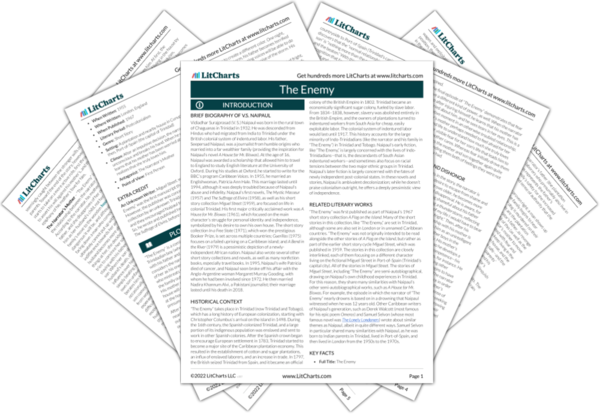Fundamentally, “The Enemy” is about the narrator’s relationship with his mother. This relationship is characterized by conflict, even hatred, yet also by an underlying love. At the start of the story, the narrator explains that his mother hates his father, and she also resents the narrator for choosing his father over her when his parents separate. She calls him “your father child […] not mine.” The narrator bonds with his father during the short time they live together without the narrator’s mother, but after his father’s death, the narrator soon “forgets” his father and thinks of himself as a “boy who had no father.” He even becomes grateful that his father has died when he and his mother move from the countryside to Port-of-Spain (Trinidad’s capital city), and he discovers that the “normal relationship between father and son” is “nothing more than the relationship between the beater and the beaten.” With this, the narrator expresses his painful recognition that family relationships can be characterized by conflict and antagonism just as much as by love.
And indeed, the narrator’s relationship with his mother soon becomes a constant struggle between “the beater” (his mother) and “the beaten” (the narrator). The narrator sees his mother as an “enemy” who misunderstands and disapproves of him. She beats him and criticizes him, and in turn the narrator develops a disobedient streak and looks forward to “escaping” from her when he grows up. But at the end of the story, when the narrator gets hurt in an accident, his mother rushes to the scene, crying. For the first time, the narrator discovers that his mother can be “worried and anxious” about him—in other words, he discovers that his mother, the woman he has considered his “enemy,” truly loves him. Through this ending, the story suggests that even the most fraught familial relationships often conceal an underlying love, even if neither person realizes that this love exists until loss, or the fear of loss, causes it to come out into the open.
Familial Love and Conflict ThemeTracker

Familial Love and Conflict Quotes in The Enemy
I had always considered this woman, my mother, as the enemy. She was sure to misunderstand anything I did, and the time came when I thought she not only misunderstood me, but quite definitely disapproved of me. I was an only child, but for her I was one too many.
She hated my father, and even after he died she continued to hate him.
She would say, “Go ahead and do what you doing. You is your father child, you hear, not mine.”
The real split between my mother and me happened not in Miguel Street, but in the country.
My mother had decided to leave. my father, and she wanted to take me to her mother.
I refused to go.
My father was ill, and in bed. Besides, he had promised that if I stayed with him I was to have a whole box of crayons.
I chose the crayons and my father.
Everybody agreed on one thing. My mother and I had to leave the country. Port-of-Spain was the safest place. There was too a lot of laughter against my father, and it appeared that for the rest of my life I would have to bear the cross of a father who died from fright. But in a month or so I had forgotten my father, and I had begun to look upon myself as the boy who had no father. It seemed natural.
In fact, when we moved to Port-of-Spain and I saw what the normal relationship between father and son was—it was nothing more than the relationship between the beater and the beaten—when I saw this I was grateful.
My mother made a great thing at first about keeping me in my place and knocking out all the nonsense my father had taught me. I don’t know why she didn’t try harder, but the fact is that she soon lost interest in me, and she let me run about the street, only rushing down to beat me from time to time.
But you mustn’t get the impression that I was a saint all the time. I wasn’t. I used to have odd fits where I just couldn’t take an order from anybody, particularly my mother. I used to feel that I would dishonour myself for life if I took anybody’s orders. And life is a funny thing, really. I sometimes got these fits just when my mother was anxious to be nice to me.
Slowly the friendliness died away. It had become a struggle between two wills. I was prepared to drown rather than dishonour myself by obeying.
At times like these I used to cry, without meaning it, “If my father was alive you wouldn’t be behaving like this.”
So she remained the enemy. She was someone from whom I was going to escape as soon as I grew big enough. That was, in fact, the main lure of adulthood.
My mother came and I could see her eyes glassy and wet with tears.
Somebody, I cannot remember who, said, “Boy, you had your mother really worried.”
I looked at her tears, and I felt I was going to cry too. I had discovered that she could be worried and anxious for me.
I wished I were a Hindu god at that moment, with two hundred arms, so that all two hundred could be broken, just to enjoy that moment, and to see again my mother’s tears.











